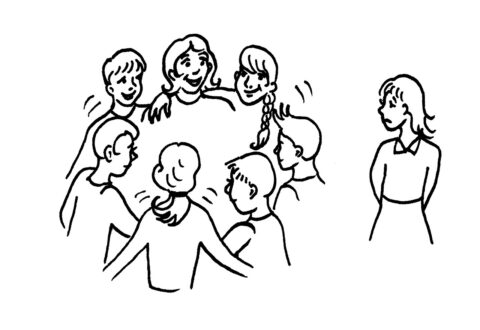You don’t want a Jezebel spirit. She used it. Prostitutes use it. Do you want to associate yourself with them?
You would think the subject matter would be most serious to prompt such statements, but think again. We are speaking of make-up.
The Bible mentions no prohibition against the use of make-up and actually shows its use. Because of this, those who teach things such as the above, have to resort to other means to promote their doctrine. You are likened to Jezebel, an unsavory woman from the Old Testament, who died in a brutal manner. You would think her death was at least in part from wearing make-up the way some spin the story. Or perhaps you are likened to a prostitute, because many of them wear make-up. Surely then if one wears make-up, their motive must be to entice and seduce others. This is hardly the case with most people who use it.
These two examples are easily debunked. Just because people do sinful things, doesn’t instantly mean that anything associated with them is wrong, sinful, or will cause others to be likened to them. As a for instance, Jezebel also fixed her hair, but you don’t hear these same people preach that a woman fixing up her hair is wrong. (In Apostolic circles, some of their hairstyles can be elaborate and/or time consuming.) Yet hair can be used in an effort to seduce, too. How many men find long hair attractive?
If a woman wears modest make-up today, people aren’t whispering and pointing fingers as she walks down the street, saying she must be a prostitute. Men don’t proposition her. Certainly no one is thinking she is like Jezebel, unless they come from a church that teaches this.
https://www.youtube.com/watch?v=LvqX6GSs5d8
When these two thoughts didn’t work to convince you to not wear make-up, they went on to a twisted meaning of a New Testament word. Don’t you know you are to be shamefaced? That is found right here in the Bible. See? 1 Timothy 2:9, in black and white. Shamefaced, sister, be shamefaced.
This is one of numerous words that is given a faulty definition in order to give the appearance that it supports their teaching. It is often taught as meaning plain, as in not having anything on your face. Here is where I encourage you to look up the original word that was translated ‘shamefaced.’ It doesn’t come close to meaning what some proclaim it does. It has nothing to do with make-up or being plain.
The word translated ‘shamefacedness’ in the KJV is a noun. In Strong’s Exhaustive Concordance it is #127. Thayer’s Greek Lexicon states it means “a sense of shame, modesty“. It further states it “is prominently objective in its reference, having regard to others”.
A Greek Lexicon Of The New Testament And Other Early Christian Literature concurs, showing the meaning as modesty in 1 Timothy 2:9 and reverence and respect as used by other writers.
In The Complete Word Study Dictionary: New Testament it shares, “Modesty, an innate moral repugnance to a dishonorable act or fashion. Aidós is grief due to the personal sense of evil. Aidós finds its motive in itself. It implies reverence for the good as good, not merely as that to which honor and reputation are attached. Only in I Tim. 2:9; Heb. 12:28, reverence, veneration.”
Vine’s Expository Dictionary of Biblical Words also agrees with the others. “‘A sense of shame, modesty,’ is used regarding the demeanor of women in the church, I Tim. 2:9 (some mss. have it in Heb. 12:28 for deos, “awe”: here only in NT). ‘Shamefastness is that modesty which is ‘fast’ or rooted in character… The change to ‘shamefacedness’ is the more to be regretted because shamefacedness…has come rather to describe an awkward diffidence, such as we sometimes call sheepishness” (Davies; Bible English, p. 12).”
Word Meanings In the New Testament further explains, “This unfortunate translation leaves the implication that Christian women should go around in public with heads bowed and eyes averted, as if they were ashamed of themselves. Not so. Actually this rendering appears to be in error. The Oxford English Dictionary says that the adjective “shamefaced” was “originally an etymological misinterpretation of shamefast” (9:620) which carries the idea of discreetness. Wyclif’s earliest English version of the Bible (1382) has the correct term here, “shamefastness.” This is used in the ASV (1901), but, of course, even this word is obsolete today.” It goes on to add, “Bernard says that it implies “(1) a moral repugnance to what is base and unseemly, and (2) self-respect, as well as restraint imposed on oneself from a sense of what is due to others.” He goes on to say: “Thus aidos here signifies that modesty which shrinks from overstepping the limits of womanly reserve” (p. 45). In our opinion, that states the case with accuracy and relevance.”
It is important to take the time to check for yourself when some minister or pastor (or anyone else) teaches on a subject. Unhealthy churches often give words meanings which are not in line with what the scriptures show. Thus you end up believing something which is not true and think God is demanding it.
Some might be interested in two short articles on the website which also address make-up: Make-up And Fingernail Polish Are a Sin and Make-up.
Examining Teachings #1: Drunk In The Spirit?
Examining Teachings #2: Jezebel and Shamefaced
Examining Teachings #3: Peculiar And Separate
Examining Teachings #4: What Must I Do To Be Saved?
Examining Teachings #5: Faith Without Works Is Dead














